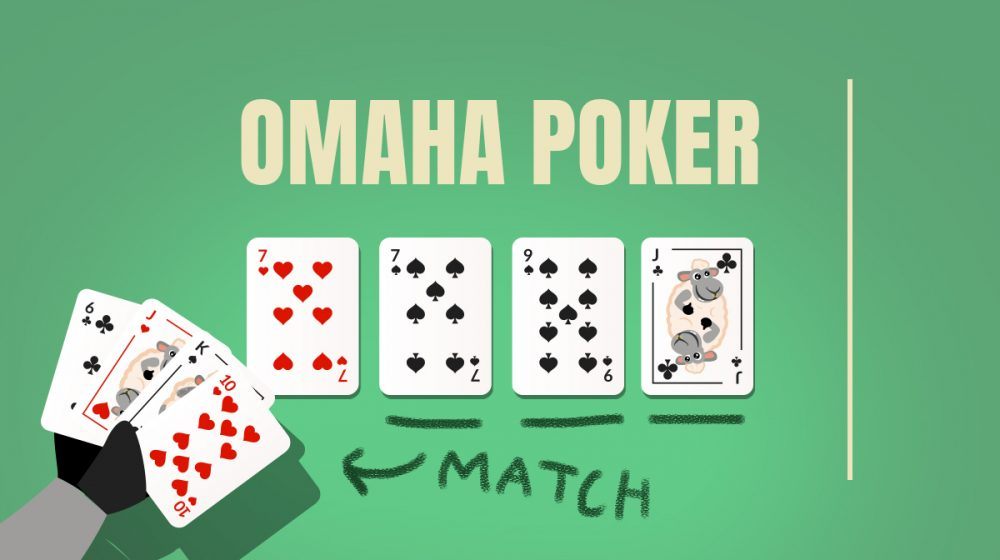Omaha Poker: A Comprehensive Guide to Mastering the Game
Are you interested in finding out more about Omaha Poker? We’ve got you covered. This version is fast overtaking Texas Hold’Em with Kiwi players as the most popular poker game variant. So why is it so popular? Let’s take a look!
In this guide, we’ll explain the basics of Omaha Poker and Omaha Poker rules. You can follow our step-by-step guide to learn how to play Omaha poker. And we’ll give you the different hand rankings and explain the major differences between Omaha and Texas Hold ’em.
Let’s get started with the basics…
The Basics of Omaha Poker
Omaha poker is a community card poker game, which is very similar to Texas Hold’Em. Each player is dealt four hole cards. From these, players need to use two to make a winning hand combination, along with three community cards. There are a few variations of Omaha Poker, including Omaha Hi, pot-limit Omaha, and Omaha Hi-Lo. This guide will focus on the more widely played pot-limit Omaha (PLO) – which is considered the easiest version of the game to learn as a beginner.
A player must use two hole cards & combine them with the community cards to create a winning hand
Omaha Poker Rules
The rules of Omaha poker are extremely similar to Texas Hold’em. If you know the basics of Texas Hold ’em, you should be familiar with this version.
You will need two to ten players to play, along with a standard 52 deck of cards. To start off, each player is dealt four hole cards.
Five cards are then dealt by the dealer face up in the centre of the table. These are commonly known as community cards. Betting rounds occur between these cards being dealt.
A player must use exactly two hole cards and combine them with the community cards to create a winning hand. This makes it a bit trickier than Texas Hold’Em. Having to use 2 of your hole cards can potentially ruin a strong hand. For instance, if all the hearts are showing on the table as the community cards and you had only one heart card, you could not make a flush as you would need to use 2 of your hole cards.
The player able to produce the highest ranking hand through a combination of at least 2 hole cards and community cards wins the pot.
How to Play Omaha Poker
As we said before, the rules and betting rounds of Omaha poker are very similar to Texas Hold’Em. There are four potential betting rounds, which take place around the community cards being dealt face-up by the dealer.
- The Deal: To begin the game, the dealer deals a maximum of four cards to each player, one by one. Once players have all four cards, the first betting round can begin, which is known as…
- The Preflop Betting Round: The player to the left of the dealer, known as the small blind, opens the first round of betting. The big blind is the player sitting next to the small blind in a clockwise direction. The big blind is required to double the bet of the small blind. The action then continues clockwise around the table. Players have the options to ‘call‘ (equal the bet of the big blind), ‘raise’ (increase the bet) or ‘fold’ (exclude themselves from the betting and go out of the game). When the bet has been ‘called’ by all players, the betting round is complete and the dealer can proceed to…
- The Flop: The dealer now deals three cards face up. These are the first cards, from a series of five which the players can use to make a winning hand. Once the three community cards are shown, a second betting round begins. The flop betting round is identical to the previous one, with one new option for the players. The players can now ‘check’ to see if other players are betting in this round. If a player does decide to check, the play skips past them to the other plays. Once other players have played, the play comes back around to the player who has ‘checked’ and now they must decide if they want to play or ‘fold’. Once players have completed their bets, the dealer can proceed to…
- The Turn: The dealer continues to deal the fourth community card. Once the dealer deals the fourth card face-up, a third betting round continues in the exact same manner as the previous betting round. The dealer then proceeds to…
- The River: The fifth and final community card is dealt face-up, after which the final betting round commences. Again, this round of betting is identical to the previous two. The finale to the excitement then begins with…
- The Showdown: The players still in play now reveal their hands. By using a minimum of two of their hole cards, with a combination of community cards, the player who can produce the highest-ranking poker hand wins the entire pot. If you’re new to the game, this is where it can get confusing. The most common mistake is to forget that you need to use at least two of your four hole cards to build your final hand.For example, you make a hand using only one hole card and think you’ve built an ace-high flush. When in reality you’re only holding a pair of Jacks, not a flush. That’s because you haven’t used two of your four hole cards to create your hand.
Omaha Poker Betting Structures
The three main betting structures in Omaha poker are pot Limit, fixed limit, and no limit.
Pot Limit
Pot limit is the most common betting structure in Omaha. In this version, the maximum bet you can make is the total sum of the chips in the pot. This ensures the betting starts off small, but it can get costly depending on each player’s bankroll.
The minimum raise amount must be as much as the last bet or raise in the same round. For example, if a player bets $10, the next player must raise a minimum of $10 (total bet of $20).
The maximum raise is the size of the pot. This includes the total of the active pot and all the bets on the table. It also includes the amount the player must call before raising. For example, if the pot size is $200 and there’s no action in the betting round, you can bet a maximum of $200. After placing the bet, it’s the next player’s move (going in a clockwise direction). They can choose to fold, call $200 or raise any amount between the minimum ($200 more) and the maximum bet. There is no cap on the number of raises allowed when playing Pot Limit Omaha.
Fixed Limit
When you play a fixed-limit betting structure, you’re using structured and pre-determined betting amounts.
You can only raise the pot a maximum of four times per betting round (per player). This includes the initial bet, raise, re-raise, and the cap, the final raise.
The bet or raise must equal the size of the blinds.
No Limit
With no-limits betting, there are no limited amounts to what players can bet at any point during the game. Players can bet as much as they want, depending on the value of their chips.
This type of betting structure is typically reserved for very high-stakes games.
When raising, the raise amount needs to be at least as much as the last bet or raise in the same round. For example, if a player bets $10, the next player needs to raise a minimum of $10 (making the total bet $20).
Variations of Omaha
There are a few different variations of Omaha you can choose to play, including:
Omaha Hi
As you might expect, in this version, the player with the highest five-card hand wins.
Omaha Hi/Lo
Another popular variation is Omaha Hi/Low. This version is when the pot is split between the player with the highest and lowest five-card hands. So you can win with a hand that would technically be a losing hand in other game versions. For example, a strong low hand would be five cards, all ranked 8 or below.
The best part about this version is that it’s possible to simultaneously hold both the highest and lowest hands during a game so that you can win the whole pot.
Omaha Poker Hand Rankings
Like in most versions of poker, the ranking hands for Omaha poker are standard:
Because you start with four-hole cards, you can make a wider range of hands than other poker variations. This means hand values are typically higher in Omaha. For example, when you’re playing Texas Hold’Em, a pair or three of a kind is usually considered a strong hand. But when you’re playing Omaha, you’re likely to generate better hands more easily, such as straights or flushes.
For example, if you’ve been dealt a 7, 8, 9 and a 10 and the river board features an 8, 9 and Jack you can build a Jack-high straight by using the 7 and 10 from your hand and three community cards. If the betting gets heavy, though, your opponent may have a Queen or King-high straight – so make sure you follow the game closely.
Omaha Poker Tips
If you’re looking to improve your Omaha game, here are some of our top tips:
Positioning
Positioning in Omaha, just like in a poker game, refers to where you’re seated at the table. Because of the different betting formats and the various combinations a player can make playing Omaha, positioning is incredibly important.
During a betting round, a player is said to be in ‘position’ of a player if they act after that player. When you’re in position, you can follow their actions and make your decisions based on their play. If you’re out of position it’s harder to make the right calls.
When you’re in position you also have a better chance of controlling the pot size. If you’re out of position your opponents will have more ability to control the pot. And capitalise on your actions.
Bluffing
Because you can make a wider range of hands when you play Omaha, there are even more options for bluffs and semi-bluffs that you can maximise. But with so many options, you need to be more strategic about when to bluff.
The more you play the easier it also gets to identify when is the best time to bluff during a game. Many experienced players often bet big draws heavily on the flop, but there plenty of opportunities available.
Blockers
Blockers are cards that help prevent your opponent from making a specific hand. So even if you holding them doesn’t help your hand, it prevents your opponent from creating a winning hand. Holding onto blocker cards helps you to direct the game, pushing your opponent away from certain hands and opening up your options.
Omaha vs. Texas Hold’em
There are many similarities between Omaha Poker and Texas Hold’em. In both games players are dealt hole cards and use these cards, with a combination of community cards, to make the highest possible hand. The structure of the game is the same, along with the betting rounds.
However, there are also a couple of major differences between the two.
Firstly, instead of two hole cards, players are dealt four hole cards at the beginning of an Omaha poker game.
The biggest difference between the two versions is the fact that a player must use exactly two of their hold cards. In Texas Hold’em, players can use a number of combinations of hole cards and community cards to make a winning hand. They can use two of their hole cards with three community cards, only one hole card with four community cards, or use no hole cards at all and ‘play across the board’ (playing with five community cards).
This rule catches a lot of players out if they are used to the Texas Hold’em version. For instance, if a player has one jack of spades and spades are faced up across the table, the player will not be able to play a flush, a pretty strong hand in poker, and instead must rely on a low hand of Jack-high. This is because you must use a minimum of two hole cards to play a hand.
Did You Know…
Early versions of Omaha Hold’em originated in cities like Chicago and Detroit, nowhere near Omaha!
Furthermore, players were allowed five hole cards rather than four. This was changed due to the limit on the number of players being able to play a game due to a standard deck being only 52 cards.
Once the games became popular it was known by many different names, such as Nine Cards, Forth Worth and Oklahoma. However, theories suggest it finally became known as Omaha as the city is close to the centre of the United States.
Find Casinos to Play Omaha Poker Online
Now that you know the basics of Omaha poker, you may want to try your hand at putting theory into practice. Fortunately for you, CasinoCrawlers has listed the best online poker sites for you to put your knowledge to the test. We recommend playing some free games to familiarise yourself with Omaha poker before advancing to real money games.
The Bottom Line
The Omaha version of poker is a great game to play for people who want more of a challenge than Texas Hold’em. Because of the rule requiring players to play two hole cards, there’s more of a variation on how players can combine their cards to create winning hands. This means there’s more strategy and thought involved in an Omaha poker game.
References:
- Wikipedia. “Omaha hold’em”, https://en.wikipedia.org/wiki/Omaha_hold_%27em#External_links
- Youtube. “Pokernews – How to Play Omaha Poker | Beginners Guide”, https://www.youtube.com/watch?v=gXoEtqm7Oos

Noah is the senior content editor at CasinoCrawlers and a writer with many iGaming articles under his portfolio. Therefore, he is skilled at writing bonus guidelines, gambling strategies, and casino reviews. During his spare time, he enjoys playing Call of Duty and is a huge rugby fan.
Read more about the author
